This Vietnam vet/road movie is a warm-hearted, meandering piece, but any similarities to Linklater’s Boyhood or the Before…trilogy end there. This is a darker story, but not dark enough, and you wish it could have been less conventional and harder-hitting. Set in 2003, its first scene is in a run-down Virginia bar with Sal, a jaded alcoholic ex-marine (Bryan Cranston in a stand-out performance) at its helm.

Nick Park’s utterly charming new animation channels the spirits of so many cinema and comedy ghosts that its originality can be overlooked – but it shouldn’t be. This is a fresh narrative in an era where films aimed at young audiences are dominated by sequels, prequels, remakes, comic book and TV adaptations, and it is all the better for it. The in-jokes and references come thick and fast and it’s fun spotting them. From the outset there’s a homage to Douglas Adams and the Pythons; we may be in the primordial soup but captions tell us we’re near Manchester, around lunchtime. Meanwhile two dinosaurs battle it out to the death – the end credits will identify them as Ray and Harry, homages to stop frame maestro Ray Harryhausen.
Moving rapidly on through meteors and apocalyptic fires, the noble game of football is invented by some Neanderthals who kick around a meteorite and record it in cave paintings. Their Stone Age descendants forget the skill but are pretty good at hunting rabbits and live happily in the arcadian idyll of their own verdant valley (their camp, pictured below) until some Bronze Age folk with clanking machines (shades of Heath Robinson and Studio Ghibli) come along. They are determined to take over the valley and mine it for more bronze. Can a game of footie save our loveable Early Men from being cast out into the gloom of the Badlands?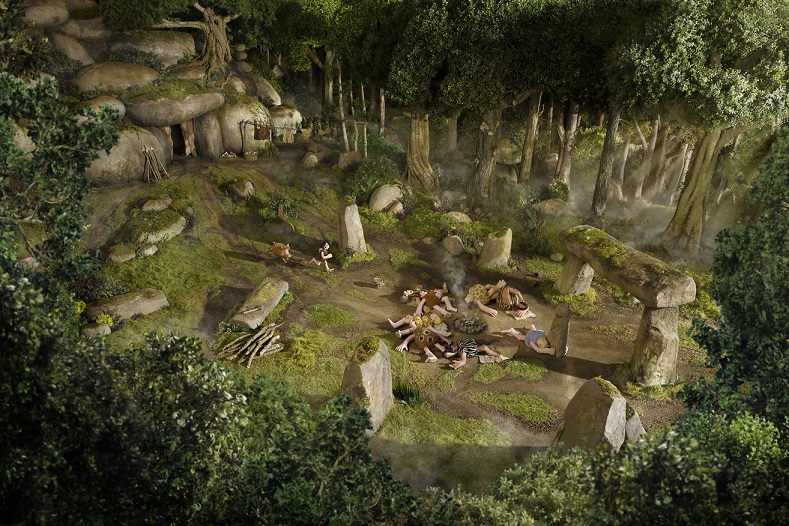 Stuffed with brilliant sight gags and a witty script by Mark Burton and James Higginson, Park’s ingenious hand-crafted animation shines throughout. The Bronze Agers who sneer at the unsophisticated Stone Agers parallel the CGI aficionados who look down on old-skool stop-frame technique. The traditional Aardman-style plasticine pinched thick brows and googly eyes work brilliantly on the characters evoked here.
Stuffed with brilliant sight gags and a witty script by Mark Burton and James Higginson, Park’s ingenious hand-crafted animation shines throughout. The Bronze Agers who sneer at the unsophisticated Stone Agers parallel the CGI aficionados who look down on old-skool stop-frame technique. The traditional Aardman-style plasticine pinched thick brows and googly eyes work brilliantly on the characters evoked here.
There’s some great voice work too – Tom Hiddleston goes all Peter Sellers’ Clouseau as imperious Lord Nooth – while Eddie Redmayne is endearing as the lead Cave Man, Dug. Park himself voices the grunts and squeaks of Hognob, the Grommit-like boar who is desperate to be of service to his friend Dug. Rob Brydon plays a giant messenger bird relaying memorised edicts between Queen Oofeefa (Miriam Margolyes) and Lord Nooth. There’s a wealth of great characters, including a gargantuan mallard with scary teeth and Goona, a feisty football player (Maisie Williams), who isn't allowed to play for Real Bronzio because she's a girlie. Instead she jumps in to train up the "plucky band of knuckle grazers" with nifty footwork and team tactics.
Where Dreamworks and even Pixar occasionally lob in sleazy jokes aimed at adults and use retro pop to please parents, Nick Park and his collaborators play it straight. If some of the references and gags go over a child’s head, none of them are embarrassing to explain. Perfectly timed for the 2018 World Cup, Early Man is a classic David-and-Goliath tale of sporting underdogs. It should enchant even the most football-hating audiences and delight soccer fans and kids alike.
Overleaf: watch the trailer for Early Man

Alexander Payne’s best-loved film is Sideways but that title may as well work for everything and anything in his oeuvre. In Election, About Schmidt, The Descendants and Nebraska, he puts America and Americans under the microscope from a variety of quizzically oblique angles. There’s another tilt shift in his latest satire.

"The Times They Are A-Changin'" has never sounded so menacing.

It beggars belief that, from the moment Steven Spielberg took delivery of the script by first-timer Liz Hannah, it took a mere 10 months to get The Post in the can. Its subject being the race to publish, that's a fitting rate of production. Introducing the film at its London premiere, Spielberg stressed the urgency of a story about the media under renewed attack. For Richard Nixon, who tried to suppress the bad news about Vietnam, read Donald Trump’s confected concept of fake news.
The Post has since acquired an extra timeliness. There’s an indelible image towards the end of Katharine "Kay" Graham, the proprietor of the Washington Post (Meryl Streep), walking down the steps of the Supreme Court through a Red Sea of young women. Yes, it's unlikely such a crowd would be gender-segregated, but as well as a clarion call about press freedom, The Post trumpets female heroism in a mainly male world. Boswell’s Life of Johnson is quoted on the matter: “a woman's preaching is like a dog's walking on his hind legs. It is not done well; but you are surprised to find it done at all.”
This is a film of two halves. We open in Vietnam, the whump of choppers evoking the first strains of Apocalypse Now. US grunts are taking a pounding in the jungle under the all-seeing eye of reporter Daniel Ellsberg (Matthew Rhys). On the flight home Ellsberg catches wind of Secretary of Defense Robert McNamara’s (Bruce Greenwood) view that the facts of an unwinnable conflict are being kept from the American public. He embarks on a covert operation to smuggle toxic evidence out of the Pentagon that successive administrations – including JFK's – have suppressed the truth about American bellicosity in Vietnam.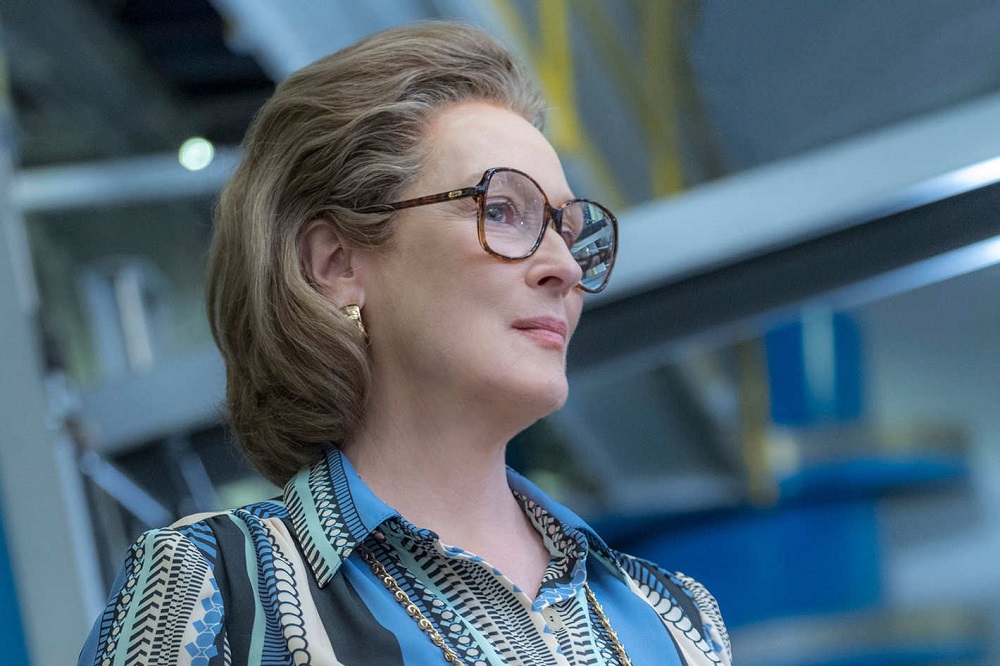 The race is on to publish: the New York Times make a start, despite the efforts of the Washington Post, rambunctiously edited by Ben Bradlee (Tom Hanks) to muscle in on their top Nam reporter Neil Sheehan. (Sheehan, a star witness in the recent series The Vietnam War, is actually unseen here.) Then the White House slaps an injunction on the Times, leaving the field open to the Post if it has the audacity to defy Tricky Dicky, whom we see yakking on the phone, through a window as if under the surveillance of posterity.
The race is on to publish: the New York Times make a start, despite the efforts of the Washington Post, rambunctiously edited by Ben Bradlee (Tom Hanks) to muscle in on their top Nam reporter Neil Sheehan. (Sheehan, a star witness in the recent series The Vietnam War, is actually unseen here.) Then the White House slaps an injunction on the Times, leaving the field open to the Post if it has the audacity to defy Tricky Dicky, whom we see yakking on the phone, through a window as if under the surveillance of posterity.
Up to this point the slow-burn narrative is a thicket of pernickety groundwork, featuring much dashing in and out of rooms and up and across busy streets. There’s some fun stuff about circumventing Nixon’s ban on the Post reporting his daughter's wedding. Then Spielberg turns up the heat and the second half blooms into a gripping disquisition on the First Amendment.
It is vastly enhanced by the authority of Streep and Hanks, the king and queen of Hollywood ideally cast as two titans of all-American integrity. To see them together for the first time – an encounter on a par with De Niro and Pacino in Heat – is one of the film’s richest pleasures. Hanks is all fizzing energy and ornery moral sense. Streep’s is a quieter performance as a woman finding her voice; when the camera, having hovered godlike above her, zooms in on her face as she makes the fateful decision, her masterclass display of uncertainty wrestling with courage merits a standing ovation. Hers is a physical journey too: when we first meet the woman who will later glide like a swan through crowds, she's either dropping things or bumping into them.
The battle isn’t solely between the Post and the White House. During the window of opportunity presented by the temporary silencing of the Times, the Post’s board is forcing through the flotation of the family-owned company. But investors can withhold much-needed funds if prompted by “a catastrophic event”. The imprisonment of the proprietor and the editor would answer to that description. The internal skirmish between pragmatists and idealists adds to the sense of jeopardy, though it also feels packed in to up the stakes, and therefore oddly disingenuous in a story about upholding the truth.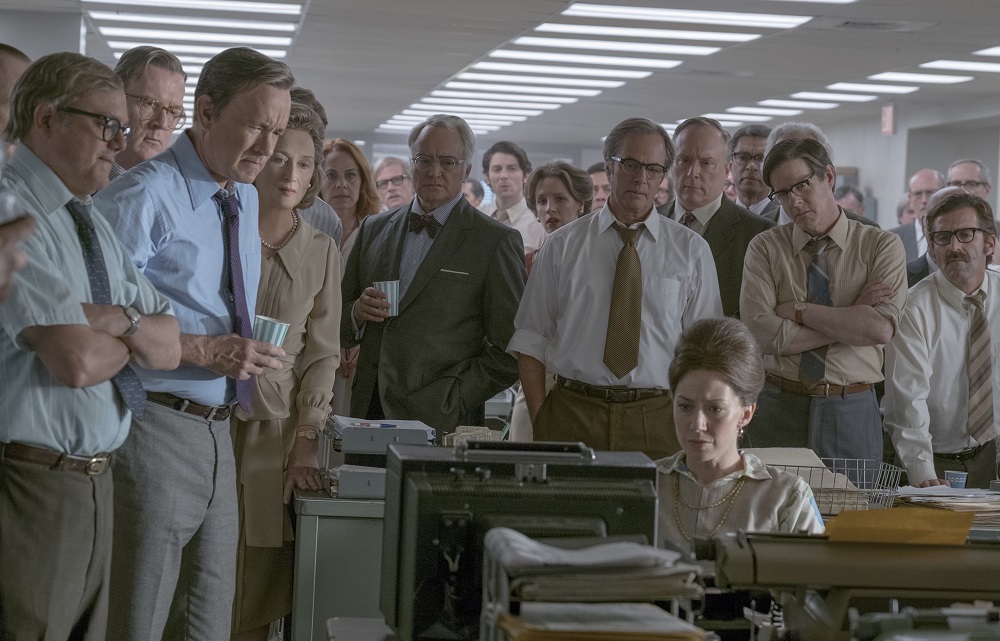 The flotation subplot helps to establish Kay Graham – who has inherited her role from, successively, her late father and husband, dead from suicide – as a lone woman standing her ground in a phallocracy. At the American Stock Exchange she passes through all the wives waiting subserviently outside the boardroom. There are plenty of meaty supporting roles for actors – Jesse Plemons catches the eye as a preppy lawyer, Bradley Whitford as Graham's main opponent on the board. Of the other women, the role of both Alison Brie as Graham’s daughter and Sarah Paulson as Bradlee’s wife is to stiffen spines. In the bustling newsroom, Carrie Coon is a society reporter who ballsily steps up to the plate, while Jessie Mueller enjoys a spotlight at the climax when, listening on the phone, she passes on the judgement of the Supreme Court to the rest of the newsroom.
The flotation subplot helps to establish Kay Graham – who has inherited her role from, successively, her late father and husband, dead from suicide – as a lone woman standing her ground in a phallocracy. At the American Stock Exchange she passes through all the wives waiting subserviently outside the boardroom. There are plenty of meaty supporting roles for actors – Jesse Plemons catches the eye as a preppy lawyer, Bradley Whitford as Graham's main opponent on the board. Of the other women, the role of both Alison Brie as Graham’s daughter and Sarah Paulson as Bradlee’s wife is to stiffen spines. In the bustling newsroom, Carrie Coon is a society reporter who ballsily steps up to the plate, while Jessie Mueller enjoys a spotlight at the climax when, listening on the phone, she passes on the judgement of the Supreme Court to the rest of the newsroom.
In such tearjerking moments does Spielberg deposit his unmistakable pawprints. There are splendid flourishes that could only come from him: the pages of a newspaper blowing from a man’s hands in the street; Bradlee’s kid making a mint selling lemonade as the paper’s top brass set up camp in the editor's home; the thundering of the presses, causing the newsroom to shake like monsters from some other corner of the director's imagination. This is Spielberg’s Vietnam movie (unless you count Jaws), an impeccable throwback to the 1970s in tone and look. Where his dauntless contemporaries Michael Cimino and Francis Coppola ventured into the heart of darkness, he has stayed at home to explore a war on the home front, an assault on truth whose notorious sequel is evoked in a coda as a security guard at the Watergate building spots a break-in. This welcome paean to print is glorious broadsheet filmmaking.
Overleaf: TO THE RESCUE: TOM HANKS SAVES THE WORLD (AND SOME IFFY MOVIES)

Nobody is more sensitive about the notion of becoming a geriatric action hero than Liam Neeson (“guys, I’m sixty-fucking-five,” as he points out), but he can still punch bad guys and leap off moving trains with the best of ‘em. In this latest battle against the odds while the clock ticks down, Neeson is insurance salesman Michael McCauley, who commutes into Manhattan every day.

A Woman’s Life first premiered at the 2016 Venice International Film Festival, alongside the likes of La La Land, Arrival and Jackie. Though it’s taken longer to get to our shores than its contemporaries, the film feels fresh and relevant. This immensely personal character study is at times dense, but subtly effective.

The Great Man theory of history is applied by Darkest Hour director Joe Wright to his star Gary Oldman as much as their subject Winston Churchill. Oldman’s performance is the sole, sufficient reason to see a film in which little else finally lingers.

It probably won’t take long for the title to be sawn in half. Three Billboards Outside Ebbing, Missouri will become casually known as Three Billboards and its specific location will drift into a vaguely remembered background. The place name is of a piece with Martin McDonagh’s previous visits to half-mythical places: Inishmore, Inishmaan, Leenane. Ebbing is everywhere and nowhere, a no-account small town in the faceless epicentre of the Midwest where a teenage girl can be raped and murdered and nothing much will be done about it.
The eponymous billboards are stationed on the quiet country road where Angela Hayes died. Seven months on the police have made no arrests, so to get them - and the local media - to notice, her mother Mildred Hayes (Frances McDormand) pays for advertising space and plasters three posters on the billboards. They read: “Raped while dying", "And still no arrests?", and "How come, Chief Willoughby?"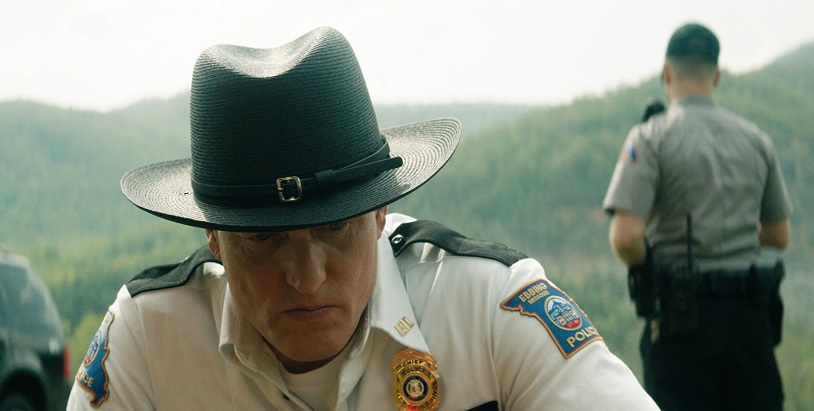 Sheriff Bill Willoughby (Woody Harrelson, pictured above) readily snaps to attention, which doesn’t necessarily appear to be a good thing. He seems at first to be from redneck central casting, enunciating obstructive platitudes with a slow suspicious drawl. But he’s nothing to the gallery of narrow-minded gargoyles under his command. Dimmest of the crop is Officer Jason Dixon (Sam Rockwell), a blue-shirted halfwit dressed in a little brief authority. And then there’s the God-fearing town itself which doesn’t take kindly to seeing its sheriff’s competence questioned - even the dentist armed with a drill appoints himself Mildred's judge and jury. It’s not just the town that’s against Mildred. Back at home her intervention causes ructions with her ex Charlie (John Hawkes), now tauntingly hooked up with a young bimbo, while her son Robbie (Lucas Hedges) doesn’t thrive in the glare of publicity.
Sheriff Bill Willoughby (Woody Harrelson, pictured above) readily snaps to attention, which doesn’t necessarily appear to be a good thing. He seems at first to be from redneck central casting, enunciating obstructive platitudes with a slow suspicious drawl. But he’s nothing to the gallery of narrow-minded gargoyles under his command. Dimmest of the crop is Officer Jason Dixon (Sam Rockwell), a blue-shirted halfwit dressed in a little brief authority. And then there’s the God-fearing town itself which doesn’t take kindly to seeing its sheriff’s competence questioned - even the dentist armed with a drill appoints himself Mildred's judge and jury. It’s not just the town that’s against Mildred. Back at home her intervention causes ructions with her ex Charlie (John Hawkes), now tauntingly hooked up with a young bimbo, while her son Robbie (Lucas Hedges) doesn’t thrive in the glare of publicity.
The film has something in common with Donna Tartt’s The Little Friend, which begins with the loss of a child and sets up the prospect of a conventional murder enquiry before veering off into something deeper and more existential. It's anchored by McDormand’s incandescent turn as Mildred Hayes, an implacable firebrand who is part fearless small-town vigilante, part hellish Greek heroine. And at the heart of her, the oil in her motor, is a bottomless well of love and grief.
Despite the pitch blackness of the story, McDonagh overlays it with ebullient, sarcastic comedy and continues his longstanding commitment to displays of ribald violence. Mildred’s wrathful vendetta at the moral impotence of men – her improvised portfolio of brute stares, sceptical eyebrows and thuggish retaliatory kicks - is a festival of bitter-sweet laughter. She is averse to taking prisoners or owing favours. Even when she pays back a dwarf called James (Peter Dinklage, pictured below with Frances McDormand) who in return for a date agrees not to rat on her to the police for an act of arson, McDonagh doesn’t sugar-coat the encounter.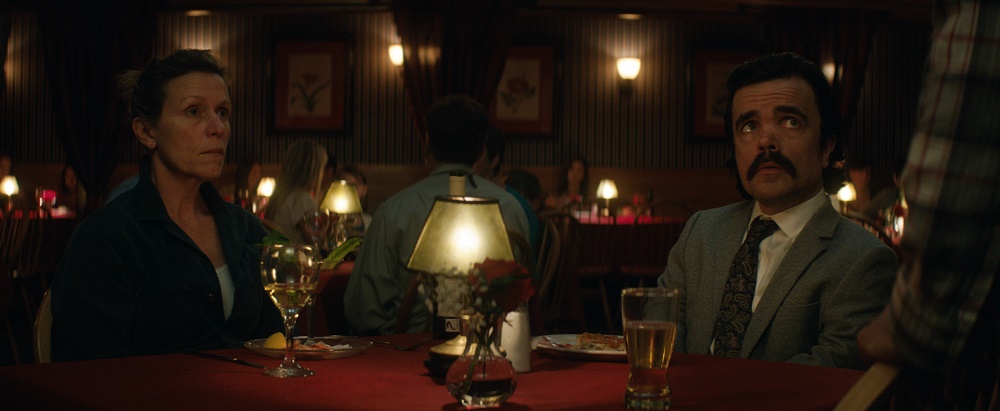 The performances, from start to finish, shimmer with conviction. Rockwell is a treat as Jason, who against the odds is vouchsafed a shot at redemption. Harrelson is beautifully subtle as a sheriff who is far more than he seems. Clarke Peters has fun late on as a police chief descending on Ebbing to clear out the stables, and Sandy Martin glowers as Dixon’s taunting porch-bound mother.
The performances, from start to finish, shimmer with conviction. Rockwell is a treat as Jason, who against the odds is vouchsafed a shot at redemption. Harrelson is beautifully subtle as a sheriff who is far more than he seems. Clarke Peters has fun late on as a police chief descending on Ebbing to clear out the stables, and Sandy Martin glowers as Dixon’s taunting porch-bound mother.
McDonagh’s third film as writer-director, after In Bruges and Seven Psychopaths, is by some distance his most persuasive and involving yet, a furious tragicomedy which comes in to land at exactly the right time. All the awards that head its way - above all for McDormand whose performance amounts to an incineration of the patriarchy - will be well merited. Catch it now. Those billboards, which faintly evoke the crosses on Golgotha, need to be seen on the biggest screen.
See a clip from the film overleaf

The last time we saw Christian Bale in a western, he was playing the downtrodden rancher Dan Evans in James Mangold’s punchy remake of 3.10 to Yuma. No doubt it was valuable experience for his role in Hostiles, Scott Cooper’s smouldering flashback to the last days of the Frontier, where Bale plays veteran US Cavalry captain Joseph Blocker.

